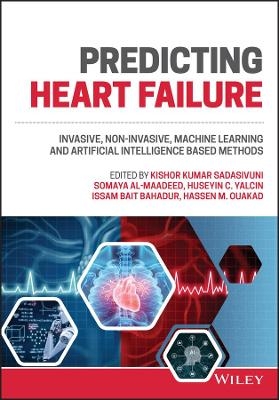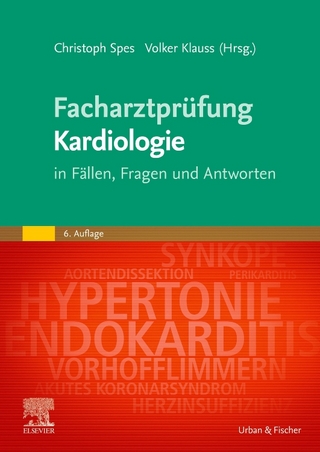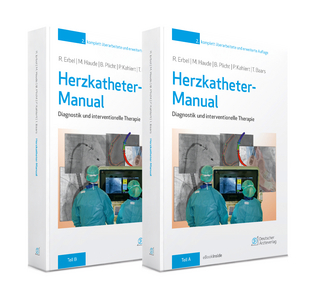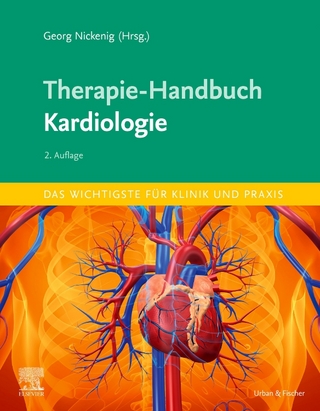
Predicting Heart Failure
John Wiley & Sons Inc (Verlag)
978-1-119-81301-9 (ISBN)
This book also provides a comprehensive but concise guide to all modern cardiological practice, emphasizing practical clinical management in many different contexts. Predicting Heart Failure supplies readers with trustworthy insights into all aspects of heart failure, including essential background information on clinical practice guidelines, in-depth, peer-reviewed articles, and broad coverage of this fast-moving field. Readers will also find:
Discussion of the main characteristics of cardiovascular biosensors, along with their open issues for development and application
Summary of the difficulties of wireless sensor communication and power transfer, and the utility of artificial intelligence in cardiology
Coverage of data mining classification techniques, applied machine learning and advanced methods for estimating HF severity and diagnosing and predicting heart failure
Discussion of the risks and issues associated with the remote monitoring system
Assessment of the potential applications and future of implantable and wearable devices in heart failure prediction and detection
Artificial intelligence in mobile monitoring technologies to provide clinicians with improved treatment options, ultimately easing access to healthcare by all patient populations.
Providing the latest research data for the diagnosis and treatment of heart failure, Predicting Heart Failure: Invasive, Non-Invasive, Machine Learning and Artificial Intelligence Based Methods is an excellent resource for nurses, nurse practitioners, physician assistants, medical students, and general practitioners to gain a better understanding of bedside cardiology.
About the Editors Dr Kishor Kumar Sadasivuni, Center for Advanced Materials, Qatar University, Qatar Dr Hassen M. Ouakad, Department of Mechanical and Industrial Engineering, Sultan Qaboos University, Oman Prof. Somaya Al-Maadeed, Department of Computer Science and Engineering, Qatar University, Qatar Dr Huseyin C. Yalcin, Biomedical Research Center, Qatar University, Qatar Dr Issam Bait Bahadur, Department of Mechanical and Industrial Engineering, Sultan Qaboos University, Oman This publication was supported by Qatar University Internal Grant No. IRCC-2020-013 and Sultan Qaboos University through Grant # CL/SQU-QU/ENG/20/01, respectively. The findings achieved herein are solely the responsibility of the authors.
Preface vii
Abbreviations ix
Acknowledgment xvii
1 Invasive, Non-Invasive, Machine Learning, and Artificial Intelligence Based Methods for Prediction of Heart Failure 1
Hidayet Takcı
2 Conventional Clinical Methods for Predicting Heart Disease 23
Aisha A-Mohannadi, Jayakanth Kunhoth, Al Anood Najeeb, Somaya Al-Maadeed, and Kishor Kumar Sadasivuni
3 Types of Biosensors and their Importance in Cardiovascular Applications 47
S Irem Kaya, Leyla Karadurmuş, Ahmet Cetinkaya, Goksu Ozcelikay, and Sibel A Ozkan
4 Overview and Challenges of Wireless Communication and Power Transfer for Implanted Sensors 81
Mohamed Zied Chaari and Somaya Al-Maadeed
5 Minimally Invasive and Non-Invasive Sensor Technologies for Predicting Heart Failure: An Overview 109
Huseyin Enes Salman, Mahmoud Khatib A.A Al-Ruweidi, Hassen M Ouakad, and Huseyin C Yalcin
6 Artificial Intelligence Techniques in Cardiology: An Overview 139
Ikram-Ul Haq and Bo Xu
7 Utilizing Data Mining Classification Algorithms for Early Diagnosis of Heart Diseases 155
Ahmad Mousa Altamimi and Mohammad Azzeh
8 Applications of Machine Learning for Predicting Heart Failure 171
Sabri Boughorbel, Yassine Himeur, Huseyin Enes Salman, Faycal Bensaali,Faisal Farooq, and Huseyin C Yalcin
9 Machine Learning Techniques for Predicting and Managing Heart Failure 189
Dafni K Plati, Evanthia E Tripoliti, Georgia S Karanasiou, Aidonis Rammos,Aris Bechlioulis, Chris J Watson, Ken McDonald, Mark Ledwidge, Yorgos Goletsis, Katerina K Naka, and Dimitrios I Fotiadis
10 Clinical Applications of Artificial Intelligence in Early and Accurate Detection of Low- Concentration CVD Biomarkers 227
Meena Laad, Sajna M.S, Kishor Kumar Sadasivuni, and Sadiya Waseem
11 Commercial Non-Invasive and Invasive Devices for Heart Failure Prediction: A Review 243
Jayakanth Kunhoth, Nandhini Subramanian, and Ahmed Bouridane
12 Artificial Intelligence Based Commercial Non-Invasive and Invasive Devices for Heart Failure Diagnosis and Prediction 269
Kanchan Kulkarni, Eric M Isselbacher, and Antonis A Armoundas
13 Future Techniques and Perspectives on Implanted and Wearable Heart Failure Detection Devices 295
Muhammad E.H Chowdhury, Amith Khandaker, Yazan Qiblawey, Fahmida Haque, Maymouna Ezeddin, Tawsifur Rahman, Nabil Ibtehaz, and Khandaker Reajul Islam
Index 321
| Erscheinungsdatum | 29.04.2022 |
|---|---|
| Verlagsort | New York |
| Sprache | englisch |
| Maße | 170 x 244 mm |
| Gewicht | 822 g |
| Themenwelt | Medizin / Pharmazie ► Allgemeines / Lexika |
| Medizinische Fachgebiete ► Innere Medizin ► Kardiologie / Angiologie | |
| ISBN-10 | 1-119-81301-8 / 1119813018 |
| ISBN-13 | 978-1-119-81301-9 / 9781119813019 |
| Zustand | Neuware |
| Haben Sie eine Frage zum Produkt? |
aus dem Bereich


